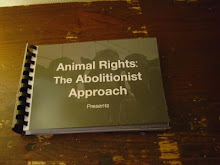This week I talk about something that was inspired through a conversation from the last street stall we did and also by a lot of things going on lately and in fact by all the things I have learned over the last 4 years since I went vegan.
Here is the link to the story I talked about from the Horn of Africa (note - ignore the bit about the "cattle" and please investigate the other related stories on there such as This One and This One)
Here is a link to a petition against the NZ Food Bill, and here is the link to the Food Bill itself, and THIS is an interesting article that someone kindly sent to me about it.
Here is the link to the Vegan Pensieve article I mentioned about eggs - Warning - disturbing photos
And finally, Please Read Gary Francione's Books. The book I mention in the podcast that I quote from is Animals, Property and the Law.Publish Post
Thanks for listening












There's absolutely a thing as second hand computers--my best friend makes a living selling second hand computers :)
ReplyDeleteThanks Corey! :)
ReplyDeleteThe sweatshops objection seems to be quite common; people use it to trivialise animal exploitation as a lesser issue that ought only to be addressed once all the human issues are solved.
ReplyDeleteHowever, I think there is a false analogy between sweatshops and animal exploitation. With animals raised for food and other products, there is a 1:1 correlation between consumption and the amount of animals suffering. The less products that are consumed, the less animals are born (or in the case of fish, less are caught). Supposing enough people boycotted Foxconn to decrease the amount of workers needed at the factories, that would mean that there would be more people without jobs. Considering that the workers weren't forced to work there, it seems they would rather work in bad conditions than remain in a worse state of poverty.
So I'm not sure if boycotting the products is the best solution. Perhaps the answer is to advocate for better working conditions. From an environmental perspective, consuming less of these products seems like a good strategy though.
Thank you Anonymous yes I am very conflicted and I feel incredibly under-informed (which I take responsibility for). I appreciate the input. :)
ReplyDelete@Anon
ReplyDeleteCorporations take advantage of poor people who are not in a position to stand up for themselves. People in under-developed countries who accept jobs in factories are frequently lied to about the conditions they will have to work in, and are cheated out of pay they were promised. Sometimes they choose to stay because the pay is still better than what they would have otherwise, but there are many cases of factories coercing workers in quasi-slavery (here, I'm thinking of factories that force workers to live in some sort of on-site dorm, and where they over-charge the workers for residence, meal plans etc., so that at the end of the pay period the worker either has nothing left over, or is in debt to the company, and is therefore forced to stay).
Your comment about workers "chosing" to work in factories ignores the structural class inequialities created by capitalism that render "choice" meaningless. The fact that people are poor because their governments are violent and corrupt does not make it OK to go to their countries and introduce a new form of oppression. Two wrongs don't make a right. (I should also add that, given current consumption patterns, it is physically impossible to have "better" working conditions. The massive amount of crap that Westerners currently consume cannot be mass-produced in any way but cheap, sweatshop labour. So a boycott/significant reduction of consumption is not only warranted, but [I would argue] ethically necessary.)
Having said all of that, I agree that the capitalism objection to veganism makes no sense (inequality is not the same thing as chattel slavery) and is probably just another excuse pushed by some leftists who want to maintain an anthropocentric/speciesist definition of "social justice".
And Liz, thanks once again for sharing my article and for doing this awesome podcast :)
Thanks Maya for your great article and thank you for this comment which I found very informative and helpful. I really appreciate all the input, and I realise I have a lot to learn! It is something I really want to learn more about.
ReplyDeleteThanks for the comment, Maya, I appreciate your insight on this topic.
ReplyDeleteI'm looking at the issue here on consequentialist grounds, although I realise that may not be only or best way of approaching it. I'm aware that choices are much more limited in some countries, so any choice that is made might be between different evils. For example, the worker may have to choose between working in a sweatshop or as a street worker, if no other options are available. I agree that two wrongs don't make a right, but what about the choice between a wrong or a worse wrong? The root cause, from what I understand, is poverty and perhaps lack of education about what the workers are getting themselves into. So maybe we should be focusing on addressing the problem by reducing poverty and educating people?
We could mechanise some or all of the production of many/most products, eliminating the need for assembly line workers. Better yet, the products could be designed to last much longer, which would reduce environmental impact as well. Both approaches would cause problems under the capitalist system - workers would lose jobs and companies would be "hurt" as less of their products would need to be purchased. This is the mixed consequence of automation, but think could be used as a positive strategy going forward. If you haven't heard of it already, I recommend checking out the Venus Project which advocates a societal structure that bypasses the need for money and workers by the use of automation.
I definitely agree that we should cut down the consumption of these products, especially non-renewable resources that are quickly being used up. But I'm not sure if an absolute boycott (like veganism) is required ethically for sweatshops, on consequentialist grounds.